8+ Sample Hotel Action Plan
-
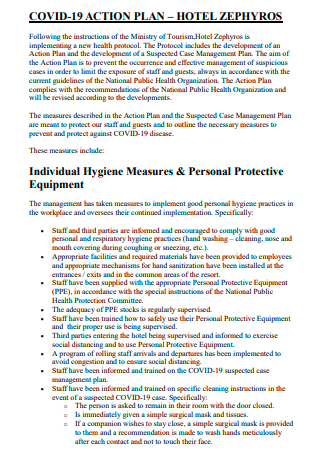
Hotel Action Plan Template
download now -
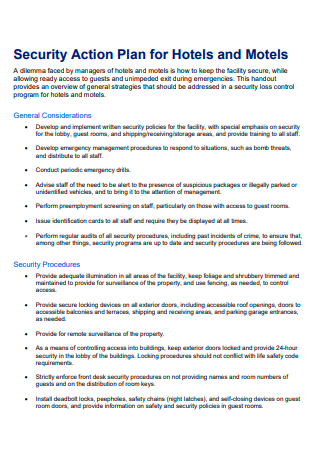
Hotel Security Action Plan
download now -
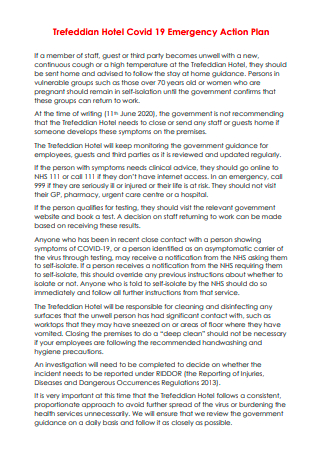
Hotel Emergency Action Plan
download now -
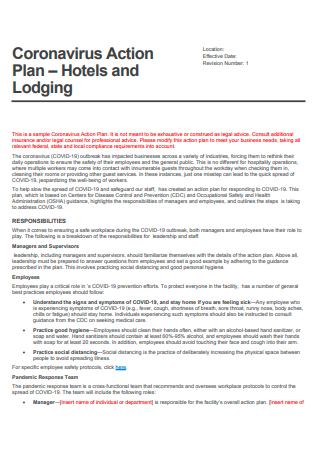
Hotel and Lodging Action Plan
download now -
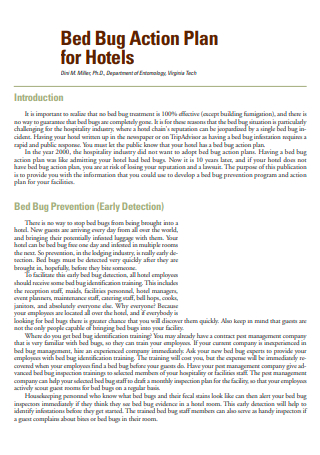
Hotel Action Plan in PDF
download now -
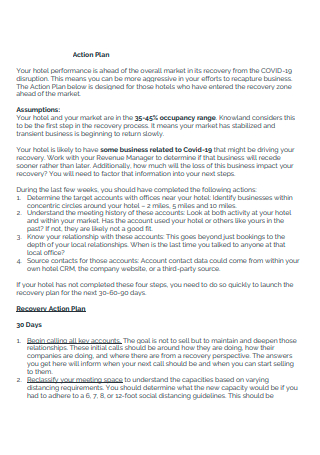
Basic Hotel Action Plan
download now -
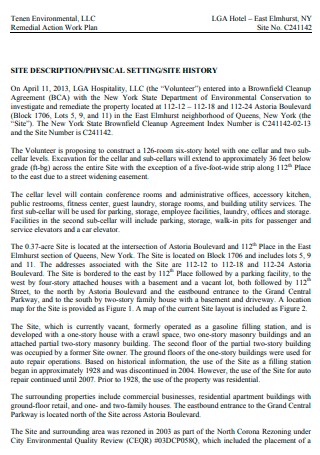
Hotel Site Action Plan
download now -
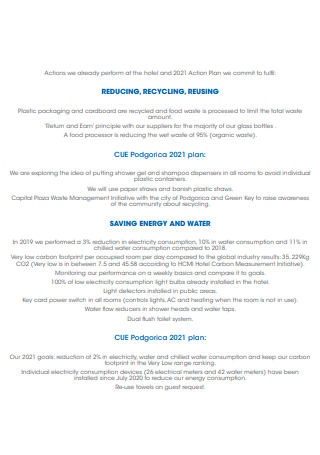
Hotel Action Plan Example
download now -
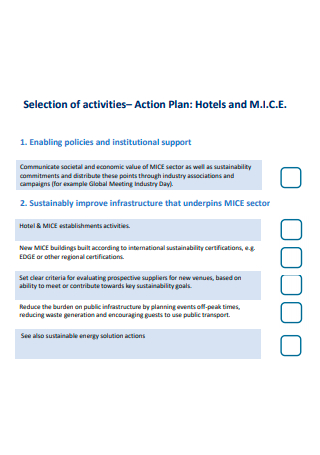
Formal Hotel Action Plan
download now
What Is a Hotel Action Plan?
This form of the action plan, a hotel action plan, is a strategic outline plan designed to provide a bird’s-eye view of what to do, how to do it, and what to anticipate when risks and dangers are present. The purpose of the action plan is to generate a list of initiatives that will help the user and their business. A hotel action plan aims to ensure that everything possible is done. All that could be employed, such as the available resources, can be put to good use to attain the predetermined objective. It is a road map to a more efficient and effective means of achieving their goals. If they aim to preserve peace and order, they would write about it and devise a strategy to achieve it. According to statistics, the hotel business‘s growth rate is 19.1%.
Benefits of Investing in a Hotel
A hotel is more than a potentially good piece of real estate since it is an actively operating business with a real estate component. Most of a hotel’s worth derives from its demonstrated capacity to earn cash and its potential to grow cash flow. The sturdy operating character of the hotel is one of the key reasons you should include it in your real estate portfolio. Hotel investment is distinct from the Big Four commercial real estate asset groups – multifamily, office, industrial, and retail – in several respects. The active part adds risk and unpredictability but also provides a plethora of extra benefits that invest in hotels more attractive. The following reasons for investing in hotels are merely a starting point. Any experienced hotel investor could easily add ten or more reasons to this list.
Tips for Having a Successful Hotel Business
What makes a hotel successful? The key to victory in the hotel sector is finding new methods to exceed customers’ expectations and create memorable events for clients. If you strive for these seven things, you will be well on your path to success.
1. Keep an eye on the feedback
Feedback can aid in enhancing your entire site, but you cannot rely solely on checkout feedback forms. In any case, your guests will not confine themselves to that. They will discuss negative encounters on social media or review websites. What can you do? Read all new reviews submitted about your hotel and respond with a soothing tone to any unhappy guests. Keep in mind that word-of-mouth is your most effective marketing strategy. Monitor the reviews of your competitors as well. Utilize evaluations to evaluate their strengths and weaknesses. Then, ensure that you are making the necessary efforts to succeed where they are failing.
2. Create excellent leads
Group business is the key to making big bucks in the hotel industry. Therefore, you must actively pursue planners and make yourself discoverable. You must spread your material through these platforms to meet planners where they are. You cannot just rely on client referrals! With a robust, interactive lead form that can be distributed via any marketing channel, it is simple to establish your direct bookings company on your website and enhance your visibility in our venue marketplace. You will not only be visible to more than 100,000 registered planners who are always searching for venues, but you will also be able to modify your listing to put your best foot forward for each of them.
3. Provide customers with a novel experience
The contemporary hotel sector encompasses much more than providing lodging and room service. You must present your guests with an authentic experience by identifying their requirements and expectations. Other activities can entice young guests who typically spend less time at the hotel. The list includes live music, poolside activities, fitness courses, spas, and unique gastronomic experiences.
4. Keep your guests safe
A comprehensive awareness of safety rules and the capacity to maintain composure in an emergency is essential. The safety and security of your visitors should always be your top priority. Ensure that all sprinklers and smoke alarms are in functioning order, that hygiene and cleanliness are maintained throughout the hotel, particularly in the kitchen, that swimming pools are cleaned regularly, that room service is current, and that guest complaints are a top priority.
5. Communicate
The most vital skill for a hotel crew is communication. Hotel managers should train their staff in communication skills to avoid errors and misunderstandings. Good communication involves listening to your visitors, comprehending their issues, and appreciating their input. Every team member’s effective communication can easily impress and convert a guest into a devoted customer.
6. Give management some leeway
Customers can have vastly varied hotel expectations. Empowering your hotel managers to make decisions in time-sensitive situations enables them to provide prompt service to your customers. This decision-making authority affords them the potential to reverse an improbable scenario, enhancing the hotel’s reputation and fostering client loyalty and contentment.
7. Be observant
To give your guests the most satisfactory possible experience, you must pay close attention to every tiny aspect of the hotel. It includes greeting your guests with a smile, placing fresh flowers in the lobby vase, delivering fantastic customer service, offering delicious food, keeping napkins folded, and maintaining a quick checkout, among many other duties. The hotel sector can be challenging, but not if you have the winning recipe. Ensure your property and crew possess these eight characteristics, and your firm will flourish.
How to Start a Hotel Business
You are not alone if you thought about how to begin a hotel business. Today, the hotel dream is alive and well in a world where anybody can become a hotelier by listing their home on Airbnb. Still, the global epidemic has made it more necessary than ever for aspiring hoteliers to launch their entrepreneurial endeavors with diligence and forethought. Despite the problems posed by the epidemic, they will pass with time, and it has never been easier to realize your ambition of opening a hotel! Here are some steps to start a hotel business if you’re still interested.
Step 1: Want to build or purchase?
You must first decide whether to purchase an existing hotel or build one from scratch. When we questioned whether our hotel owners would choose to create a new hotel or buy an existing one for their future property, 72% said they would instead build a new one. This surprised us because construction is inherently riskier and more capital-intensive. There is a performance history, and you know what you’re getting with a hotel acquisition: a cash-generating hotel business that is already turnkey. Additionally, you skip the time-consuming logistics of acquiring permits, planning the space, and developing the property. Not to mention a helpful database of previous guests and a staff already familiar with the property. Also, establishing your property grants you greater control over the experience’s inception. New hotel developments can generate more long-term profits than purchasing an existing hotel. In general, once the project is completed, you can earn more money because you assumed more risk — including the possibility of a windfall if you ever decide to sell. However, it is significantly riskier because your funds would be locked up for an extended time with no income. When considering whether to build or purchase a hotel, you’ll need a thorough market analysis to confirm the excellent market trends that encourage new hotel developments. Existing assets should also be evaluated for potential savings, such as adding new technology to streamline operations and increase bottom-line profitability. These efficiencies allow you to generate a more significant profit from the current hotel, making it a considerably better investment than it would have been otherwise.
Step 2: Analyze the information and evaluate the feasibility
After deciding whether to purchase or construct, the following step is to ensure that the economics add up. The numbers will tell you how much cash you’ll need, how much that capital will cost, how long it will take to turn a profit and your potential upside as an operator/owner/investor. Consider your profitability estimates carefully, focusing on their relationship to the cost of capital. Calculate the cost of your money and ensure that your pro forma demonstrates that you will earn enough profit to cover the risk.
Step 3: Create a hotel business plan
Now that you understand your financial expectations, it is time to create a business strategy for your hotel. This is your plan for launching, promoting, and operating your new business. Acquiring investment, especially from traditional institutions such as banks with stricter requirements, will be practically hard without a clear business strategy. So, what should your hotel business strategy include? A successful business plan generally assesses the company’s strengths, weaknesses, opportunities, and threats (also known as a SWOT analysis) for each business division. In addition, it demonstrates how your hotel fits into the local market and more significant industry trends. In the end, this is a narrative document, avoiding the trap of unduly formalizing everything. The urge to talk in corporate jargon is tremendous!
Step 4: Make a plan for your digital presence and distribution
Getting to this point means you’ve reached the money you need and are working on building your line strategies for your business. It’s both exciting and scary. To start, you’ll need to set up a website for your hotel. This is the world’s business card for you. It should be a modern website made and optimized for eCommerce, with a booking engine that works on all devices. Your website is the core of your direct booking strategy, so you want it to work well and help you get as many commission-free bookings as possible.
Step 5: Pre-opening strategies
As more properties and brands enter a market that is already full, the experience becomes the primary way to stand out. You must make sure that your guests have a great time. This will help you get great reviews and make your new property stand out in a crowded field. Use the time well while your hotel is being built to set up its operations the right way from the start.
Step 6: Host a remarkable opening party
It is finally time to celebrate the rewards of your labor: throw an opening party! This is a moment worth celebrating with friends, family, coworkers, and investors, as well as with influencers who can amplify the launch of your hotel. One kind of launch is to have a private “soft opening” party for a small group of close friends. This allows you to evaluate the venue and determine its suitability for organizing events. Then, once you’ve ironed out the problems, you invite influencers, VIPs, and other locals to an “official” launch party.
FAQs
What are action plan activities?
An action plan summarizes the steps necessary to execute a straightforward project or target. To create one, create a list of the tasks you need to perform to complete your project or achieve your goal.
What are the action steps?
An action step is a discrete task that may be completed in a certain amount of time. Break goals into actionable steps by focusing on “progressing” rather than “reaching” the plan. Goals should be challenging and action actions simple.
What is a strategic action?
Strategic actions are projects or programs that go beyond an organization’s daily activities to help it achieve its strategy. They are such things as. Bringing about change, giving people the skills to do something new or better, or improving performance.
Even if the future is more unclear than ever, you do not need to allow uncertainty to damage your business. With good planning and strategy, you will always be prepared to handle any issues that could disrupt the operation of your hotel. Always have a backup plan to be more secure in the face of drastic developments. If you wish to build a hotel action plan immediately, please refer to the free templates above. Downloading is only one click away, so download it directly!
